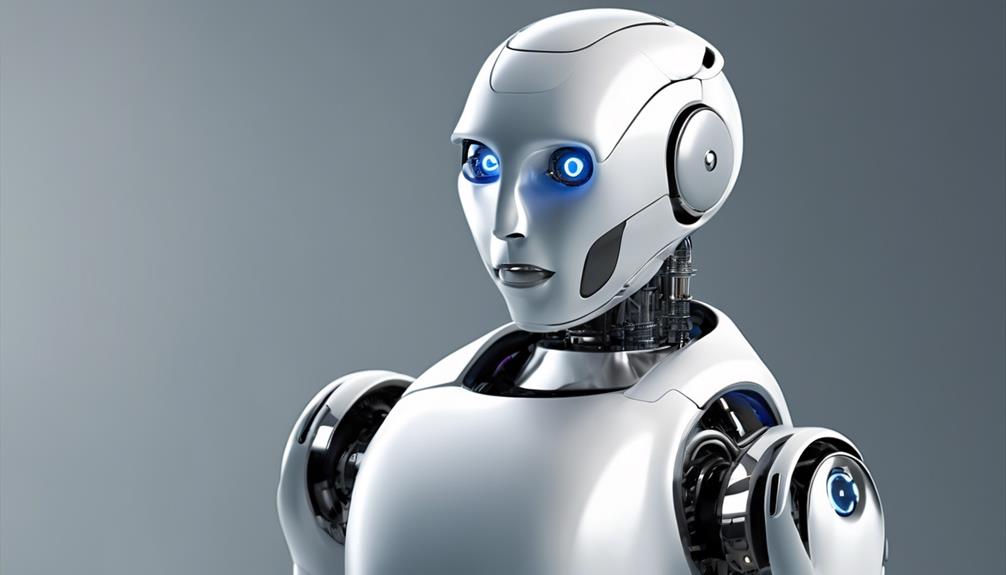As technology advances, the use of artificial intelligence (AI) in various industries raises questions about the future of certain jobs. From telemarketers to accounting clerks, the potential for AI to replace these positions is becoming more evident.
However, the impact of AI on other roles remains a topic of interest. Delving deeper into the implications of AI on job markets could unveil not only the jobs at risk but also shed light on the skills and roles that are less likely to be automated.
Key Takeaways
- Telemarketers and receptionists face replacement by AI chatbots and virtual assistants.
- AI threatens bookkeeping clerks and couriers with automation in routine tasks and delivery services.
- Compensation managers and HR professionals shift to strategic roles with AI handling operational tasks.
- Skills enhancement and exploring alternative career paths are crucial for professionals in customer service, finance, and management.
Telemarketers
Telemarketers face a challenging future as advancements in AI technology revolutionize customer service interactions and sales processes. With the rise of AI-powered chatbots efficiently handling customer interactions and language modeling AI tools for sales calls analysis, the role of telemarketers is at a critical juncture.
The job outlook for telemarketers appears bleak as AI continues to enhance customer service automation, potentially leading to a decline in job opportunities within the field. As AI technology disrupts traditional sales roles, telemarketers must consider exploring alternative career paths to stay relevant in the evolving landscape of communication efficiency.
The efficiency and accuracy that AI brings to customer communication present both a threat and an opportunity for telemarketers to adapt and potentially transition into roles that leverage their expertise in new ways. Navigating this shift will require proactive measures to stay ahead of the curve in an industry where AI is reshaping conventional practices.
Bookkeeping Clerks

The future of bookkeeping clerks is rapidly evolving as advancements in artificial intelligence technology revolutionize traditional accounting practices. AI's capabilities in automating routine accounting tasks such as data entry and transaction recording pose a significant challenge to the role of bookkeeping clerks.
AI-driven accounting systems can accurately analyze financial data, potentially reducing the demand for manual intervention in bookkeeping processes. The projected job growth for bookkeeping clerks stands at a declining rate of -4%, reflecting the increasing trend towards automation in the field.
To thrive in this evolving job market, bookkeeping clerks must adapt by enhancing their skills in financial data analysis and strategic consulting. Embracing these changes and developing expertise in areas that complement AI-driven systems will be crucial for bookkeeping clerks to remain relevant and competitive in the face of automation advancements.
Thus, the landscape of bookkeeping roles is shifting, necessitating a proactive approach towards skills development to navigate the changing demands of the industry.
Compensation Managers
Amidst the era of technological advancements, the role of compensation managers is undergoing a transformative shift driven by the potential integration of artificial intelligence solutions. AI has the capability to automate tasks traditionally performed by compensation managers, such as salary benchmarking, data analysis for designing pay structures, and recommending competitive pay practices. By leveraging AI systems, organizations can efficiently process vast amounts of data to determine appropriate compensation packages aligned with strategic company goals. The automation of compensation management processes not only enhances accuracy but also leads to cost savings.
In this evolving job landscape, compensation managers are required to adapt by focusing more on strategic decision-making. They must interpret the insights provided by AI algorithms to make informed decisions about compensation strategies. Embracing AI in compensation management allows professionals in this field to elevate their roles from operational to strategic, ensuring that companies maintain competitive pay practices while optimizing overall compensation structures.
Receptionists

As advancements in artificial intelligence continue to reshape traditional roles within organizations, receptionists face the prospect of being replaced by AI-powered virtual solutions capable of efficiently handling basic inquiries and appointment scheduling. Automation of receptionist tasks by AI systems not only streamlines operations but also leads to significant cost savings for businesses.
Chatbots and voice assistants are increasingly assuming the responsibilities traditionally held by receptionists across various industries, providing 24/7 availability and quick responses to customer queries. The rapid advancements in natural language processing and automation technologies are driving this shift towards AI-powered virtual receptionists, putting traditional receptionist jobs at risk of being automated in the near future.
- AI-powered virtual receptionists can handle basic inquiries and appointment scheduling efficiently.
- The automation of receptionist tasks by AI systems can lead to cost savings for businesses.
- Chatbots and voice assistants are increasingly replacing traditional receptionist roles in various industries.
- AI receptionists can provide 24/7 availability and quick responses to customer queries.
Couriers
With the advent of AI-powered delivery drones and autonomous vehicles revolutionizing the logistics industry, the role of human couriers is facing a paradigm shift towards automation. Companies like Amazon are at the forefront of testing drone delivery systems to enhance efficiency in courier services. The use of AI in logistics management plays a pivotal role in streamlining delivery processes, optimizing delivery routes through AI algorithms, and ultimately reducing the dependency on human couriers. Automated delivery systems are gradually becoming more sophisticated, offering cost-effective and efficient solutions for last-mile deliveries. The integration of AI-powered technologies in courier services not only accelerates delivery times but also ensures precision and accuracy in the distribution process. As these advances continue to evolve, the courier industry is poised to embrace a future where automated delivery systems are the norm, reshaping the traditional roles of human couriers.
| Advantages of AI in Courier Services | |
|---|---|
| Enhanced Efficiency | Reduced Costs |
| Optimal Delivery Routes | Streamlined Processes |
Frequently Asked Questions
What Jobs Will AI Replace in the Future?
In the rapidly evolving landscape of technology, AI is poised to revolutionize various sectors by automating routine and repetitive tasks, enhancing efficiency and productivity. This transformation will likely impact roles in transportation, administrative, production, and service industries.
Which Jobs Are AI Proof?
Certain professions, like those in management, healthcare, education, and construction, remain resilient to AI disruption. These roles demand unique skills like empathy, critical thinking, and human judgment, making them less susceptible to automation.
What Jobs Will Be Gone by 2030?
By 2030, jobs vulnerable to AI replacement include those involving repetitive tasks, data analysis, and routine functions like data entry and assembly line work. Sectors at risk include transportation, administrative, production, and service industries.
Which Jobs Can Chatgpt Replace?
ChatGPT's capabilities extend to tasks encompassing data entry, content creation, customer service, legal research, and market analysis. Its proficiency in natural language processing enables automation and efficiency in these areas, showcasing potential for widespread adoption in various industries.
Conclusion
In conclusion, as AI continues to advance, it is inevitable that certain job roles will be replaced by automation. The efficiency and accuracy that AI offers can bring significant changes to various industries.
However, the question remains: Will the human touch and emotional intelligence be lost in a world driven by artificial intelligence? Only time will tell how society adapts to this shift towards automation and the impact it will have on the workforce.









